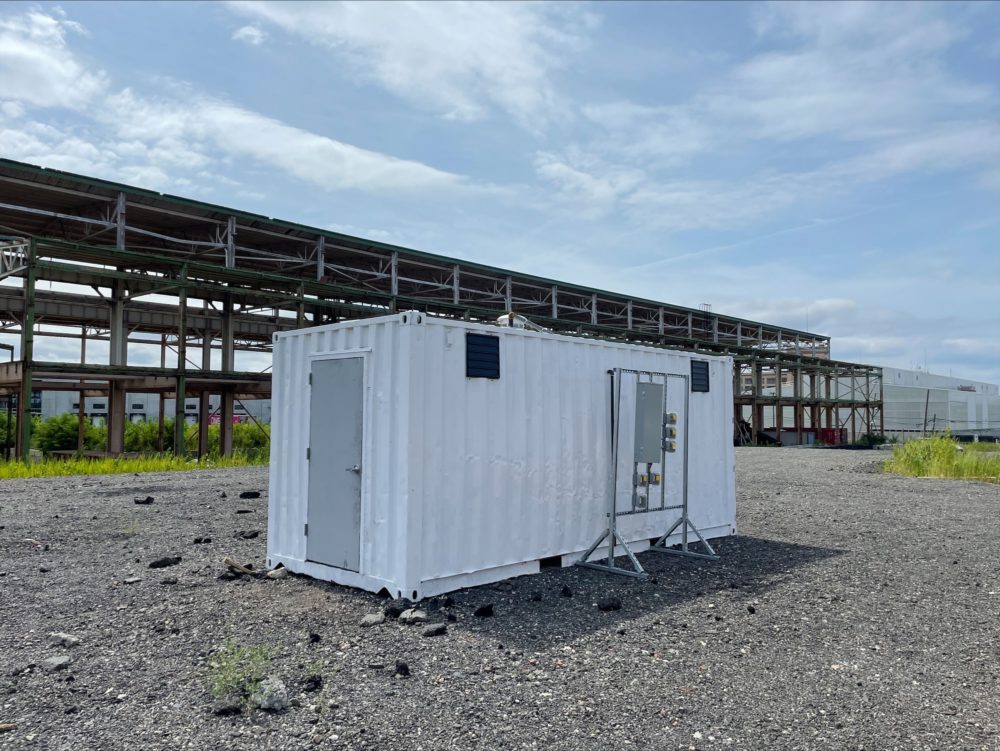If you’re anything like Kwaku Jyamfi, he says, you might tend to get lost in the details of growing a company. That’s not necessarily a bad thing — but seeking advice from others who’ve been in your place can go a long way to keep perspective.
In 2018, Jyamfi and Will McKnight cofounded Farm to Flame, a Duquesne-based startup bringing clean energy to farmers and businesses by manufacturing generators that replace diesel with carbon neutral feedstocks.
RustBuilt Pittsburgh recently caught up with Jyamfi to talk about Farm to Flame’s growth, the skills he’s developed while building the company, and the importance of hiring the right people. Read his full Q&A and watch the full interview below. The transcript of the interview has been edited for length and clarity.
1. How did you come to do this work and why is it important to you personally?
The way that Farm to Flame Energy started was with my cofounder and I at Syracuse University. I saw that my cofounder’s grandfather had a patent to the combustion process in which he burnt biomass waste, like wood waste and agricultural waste, with no smoke and no odor.
I saw the process with my own eyes. It was 2018, my senior year of undergrad. I thought it was very interesting. I never saw wood burn with no smoke and with no ash as well. There was barely any ash, and so I thought this would be very interesting, very innovative, for electricity generation and power generation. [It could] decrease a lot of maintenance and things that prohibited biomass power generation in the past. So I jumped right in.
Also, on the social impact side, it’s a clean energy solution. It’s cheaper than diesel using waste materials and biomass materials. My parents [are] from Ghana, which is an emerging nation in Africa. It’s a really special thing to be able to provide clean and affordable electricity to places that are underserved. One of our target areas is Nigeria, and India, where I also wanted to do water treatment. [I had] a strong passion from a social side as well as business and technical.
2. What was your lightbulb moment?
When Will’s grandfather showed me the combustion process, [I said] to myself, “Yeah, this can really go far for the biomass electricity industry.” I just knew from seeing the technology that first time that we would have no problem commercializing this.
3. What is the elevator pitch for Farm to Flame?
There are 700 million people in the world who don’t have access to affordable and reliable clean electricity. This population relies on expensive and dirty diesel generators for constant power. Diesel costs three to four times the regular electricity price on the grid. Diesel exhaust kills over 21,000 people per year. If, for some reason, they can’t get their hands on diesel fuel, they have no power.
So for the 700 million people around the world who are relying on diesel, Farm to Flame built a generator that is just as reliable as diesel, but half the cost and electricity with no smoke and no odor.
4. Talk through the strategy in building a team around you.
This is something that I’ve really been thinking about a lot lately as we start to grow our team and our commercialization of these generators. Something that’s really important is that we have a cohesive team that is passionate about this, that can work well together. That really has a positive [impact on] how we deploy these generators.
We need skills ranging from a systems engineer who can see the whole system from the waste feed stock arriving at our door to us feeding electricity to the customer or to the grid [and] everything in between. But then we also need specific engineers for the different components in our generator, like the boiler and the steam turbine generator, and we need leaders as well VPs of engineering to really bring everyone together.
Then on the business side and the sales side, we need a VP of Sales. We have business interns who have been very helpful, so we’re very grateful for them. The main thing about the team is just making sure we’re aligned on a mission and that we can work together in a very efficient and thoughtful way to make sure that we’re listening to the customers when designing, building, testing and commissioning these generators on their sites.
And we want to take our health into account too, both mental and physical. So, our goal and our model for Farm to Flame is to provide affordable and reliable clean electricity while becoming the best versions of ourselves, and that’s what we’re trying to implement.
5. What has surprised you most about starting your own business?
Honestly, probably the skills that I gained. I did not think I would ever really be able to have the skills I have right now — learning how to solve problems faster, learning how to be more efficient, learning how to sell, learning how to provide people service [and] value, and do it in a structured and organized way.
That was surprising because I never naturally exploited those traits. They may have been in me, but I never really got to naturally exploit them.
6. Talk about your daily rituals.
I have a couple. I wake up, I read my bible, I pray. I read my self-confidence formula. It’s on my wall right there and in my bedroom. I do exercise, so I’ll play basketball or I’ll lift weights. I’ll do that between 15 and 30 minutes.

7. What is a recent challenge you faced as an entrepreneur? How did you overcome it? What lessons did you take away from it.
A recent challenge I faced as an entrepreneur is really making sure that we set our team up to hit certain milestones. There was a point where we were just not progressing toward a certain milestone, so I really had to assess. And this was a business milestone, like a technical milestone in our product deployment and our product testing. It was really important.
What I really did is just assess how I’m going about it — what resources and who am I leveraging to solve this problem? And really making sure that I restructured my mind to leverage the right resources, the right people to solve this problem so that we could get it done in a timely manner.
Also, just looking at how can we match it at the scale that it’s needed at, and not at a smaller scale, but at the larger scale that it’s needed. So, it was really just about shifting my mind from a smaller frame of mind. What is this one thing that we may need right now to solve the problem in terms of looking at the big picture, which could help us actually solve it more efficiently?
8. What does the next year look like for Farm to Flame Energy?
We have a few projects going on right now. We have corporate waste-to-energy projects that we’re implementing, and we’re also deploying our generator. We just signed a new power purchase agreement for a 200 kilowatt generator. It’s a $4.4 million contract, and we have a bunch of other contracts that we’re just getting into place. [We’re also] building our team more to deploy these generators and help our carbon neutral goals.
9. What is a key piece of advice that you’ve received that you want to share with other founders?
If you’re anything like me, I’m a go-getter, but very focused on right now. What do we need to do right now to get to the big-picture goal? And it’s good to stay in that mindset because you’re productive and you get things done. But sometimes you want to take a step back and be a little bit strategic and be like, “How can I look at where I am and where I want to be and where the team wants to be and really make sure what I’m doing right now is efficient and effective to reach that goal?”
So, always take a step back and think of your decisions, especially the key ones as a founder when it comes to decisions that can affect the company time-wise, financial health-wise, team-wise. Just make sure you really think about it all and get advice from a great advisor who’s been in your shoes.
10. How can our regional startup community help your efforts?
I’ve received a lot of help from Pittsburgh. I’m very grateful to the whole community, from Carnegie Mellon to Ascender, and many more. I definitely feel the support already.







